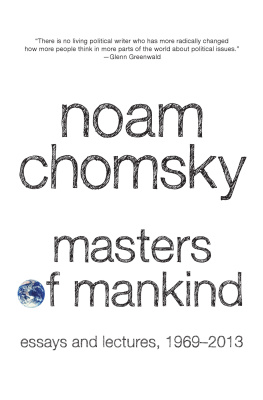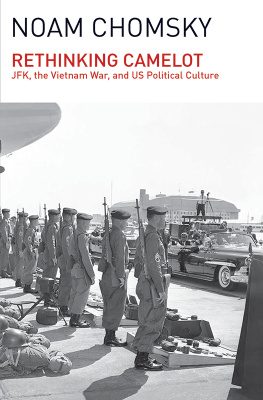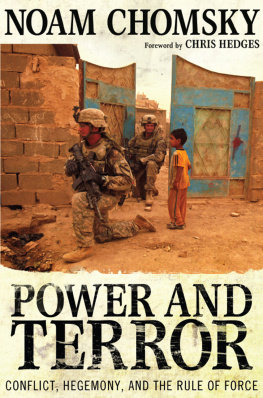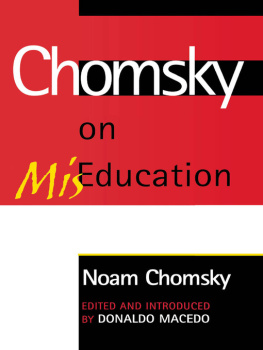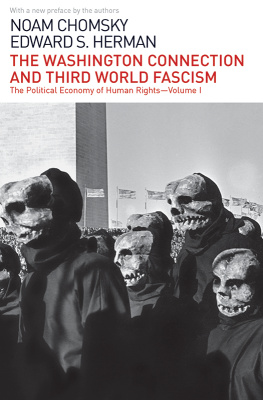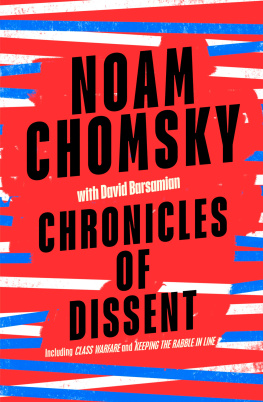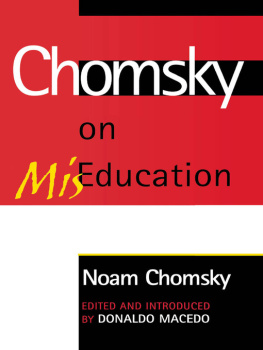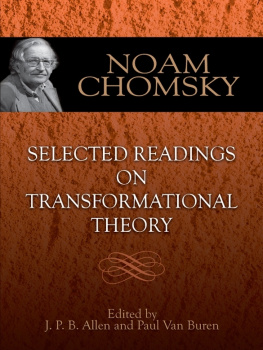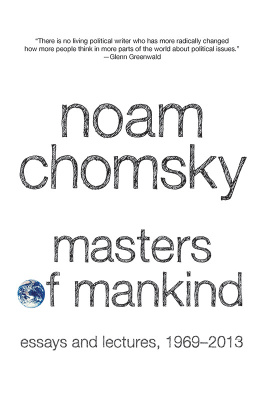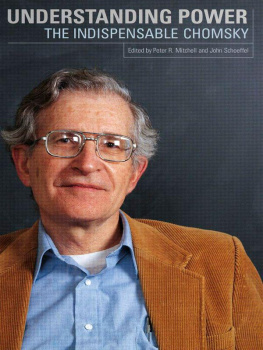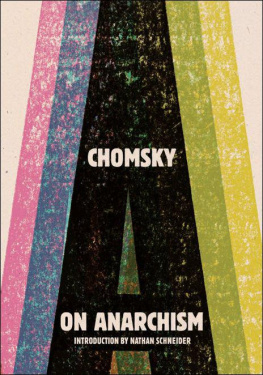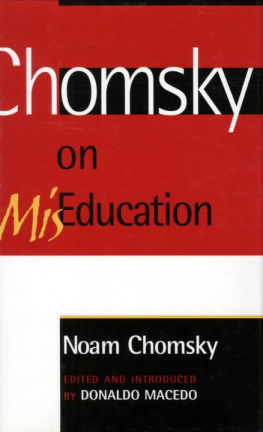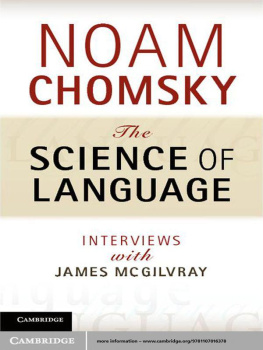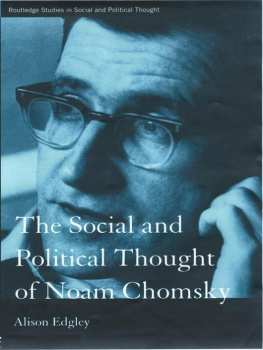Contents
Haymarket Books
Chicago, Illinois
2014 Noam Chomsky
Haymarket Books
PO Box 180165
Chicago, IL 60618
773-583-7884
info@haymarketbooks.org
www.haymarketbooks.org
ISBN: 978-1-60846-425-8
Trade distribution:
In the US through Consortium Book Sales and Distribution, www.cbsd.com
In Canada, Publishers Group Canada, www.pgcbooks.ca
In the UK, Turnaround Publisher Services, www.turnaround-uk.com
All other countries, Publishers Group Worldwide, www.pgw.com
Special discounts are available for bulk purchases by organizations and institutions. Please contact Haymarket Books for more information at 773-583-7884 or info@haymarketbooks.org.
This book was published with the generous support of Lannan Foundation and the Wallace Action Fund.
Cover design by Eric Ruder.
Library of Congress Cataloging-in-Publication Data is available.
But what all the violence of the feudal institutions could never have effected, the silent and insensible operation of foreign commerce and manufactures brought about. These gradually furnished the great proprietors with something for which they could exchange the whole surplus produce of their lands, and which they could consume themselves without sharing it either with tenants or retainers. All for ourselves, and nothing for other people, seems, in every age of the world, to have been the vile maxim of the masters of mankind. As soon, therefore, as they could find a method of consuming the whole value of their rents themselves, they had no disposition to share them with any other persons.
Adam Smith, The Wealth of Nations
Foreword
by Marcus Raskin
Noam Chomskys political activities and his understanding of the nature of language capacity may be described metaphorically as an unbroken band labeled universality . But his universality is no mystification aimed at masking truths and marginalizing truthful inquiries, nor is it the belief that all of public life must be the same everywhere. One side of the Chomsky strip is innateness, which presents humanity with the gift of language and therefore communication. Follow that strip of universality; you will note that there is imprinted on the strip a capacity that allows for rationality and moral action that can catalyze humanitys benign social purpose. We may even speculate that human nature contains a capacity for invariant empathy. We leap and conclude that humanity is more than a bunch of indivisible but empty monads unconnected except through their accidental collision; we further conclude that humankind is imprinted with an inexorable drive to create something better out of its raw material. We desire our shared knowledge to lead to love, and vice versa; we want power to be in service of both. Perhaps a humane world civilization might come into being in which universality does not assign a preferred place to any particular group, but in which all are joined in solidarity and mutual dignity with all others. However, when we look again we see that the strands of the strip are torn and they need repair. But how to repair them so that the band does not disintegrate? What are the tools we use to repair the tear? And who repairs the band of which we are an integral part?
For Chomsky, in the deepest personal sense, language becomes a critical means for the repair of the tear(s) of humanity; the structure of language is a wondrous feature of life that is simultaneously stable and infinitely malleable. In this, his views are radically different from those of Jean-Paul Sartre, who sees words and language as keeping us from the world as it is, or perhaps could be. For Chomsky, there are two courses in attaining repair and in creating something different, a new thing, a new organizational structure or alternative. One is in the spoken and written word, which comes from how we are hardwired. The other is the language of exemplary doing, where general propositions, for example about love and empathy, are made clear in action through lived experience. In politics, the body and mind are the tools to repair the body and mind.
For the casual observer, Chomsky seems to hold that on the one hand, there is science and analysis, and on the other hand, there are those desired values that we hold dear and preach about through different social means. In this world, the body is divided into unconnected categories where mind and heart, thinking and discernment, are separate from emotions and feeling. Is this not what the modern academy attempted to create, hoping in this way to ensure a soundness and civility, a series of golden lies, the distance of self from object and therefore a perverted objectivity, thereby protecting the scientist and her inquiries while intentionally missing the point of integration and wholeness?
His fellow academics were in for a big surprise if they thought Chomsky was domesticated to accept rationality as a division between thinking, passion, and political commitment in terms of how one leads a life of responsibility. This supreme rationalist in his actions and studies says that the basic concerns of intellectuals must be to speak the truth and expose lies. For him the basic concern in the political realm is to integrate knowledge, power, and love as the basis of law and value. That is to say, the ideal intellectual is to exercise responsibility through his rationality and the exercise of courage and integrity to expose lies and to tell the truth. Human responsibility beyond a designated narrow social role can be a lonely activity in a society that gets by on grease paint and self-delusion. Chomskys concern as a lover of wisdom that serves the wider humanity, as he knows and points out, can hit up against a stone wall where political thought and commentary is bereft of truth telling, even attempts at it.
It takes very little to find out what and whose interests are served when responsibility is defined in action as service to a master. Just spend a Sunday morning with the commentators on television whose interests have virtually nothing to do with truth telling and whose programs are sponsored by agribusiness and power companies. Responsibility morphs into servility. For many in the world of journalism and politics the consequences of what they do and why may not necessarily be known to them. The structure of Sunday morning news allows Exxon and a state apparatus to guide the journalist and the people listening. And this has dire consequences for a peaceful constitutional democracy. Read in Chomskys On Power and Ideology the words of a columnist and former ambassador, William Shannon, who asserts that for the best of motives the United States ends up supporting military dictatorships, perhaps forgetting that everyone always claims the best of motives. Throughout history American leaders have never shirked their responsibility of explaining in high-minded terms the American role in Asia, Africa, the Middle East, and Latin America. Politics is the means that tells us how we are going to arrange and use the mirrors of everyday life. It arranges the framework that turns ought into is in culture and experience. This is why practical actions, in the sense of choosing and responsibility, determine the course of human history.
This is why Chomskys analysis and his practical actions are so important. They are the bellwether of what could be . His drive and commitment come from a directed use of passion, intuition, and a deeply held responsibility for others. It is what I have termed standing with or withness. But withness is more than reporting to others. Withness takes us beyond personal interest, accepting the risks of the other when there is no pragmatic reason to do so. Withness is an instrument of awareness that helps us to know where and who we are, for it locates ourselves with others, and asks through example that others relocate and reorder themselves. When Henry David Thoreau, protesting the poll tax, was asked by Ralph Waldo Emerson, Henry, why are you here? Thoreau responded, Waldo, why are you not here?
Next page
